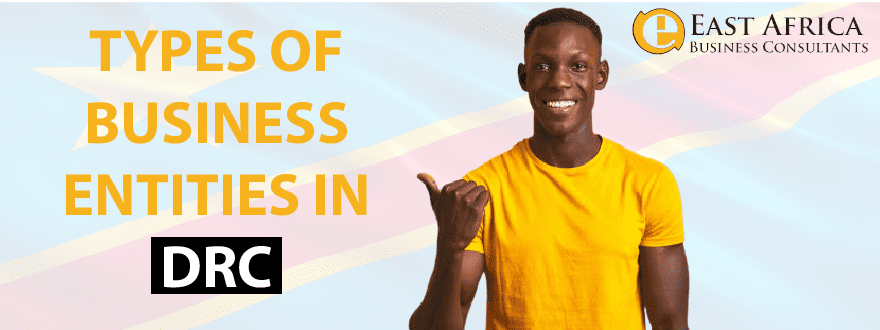Types Of Business Entities In DRC
Types Of Business Entities In DRC
There are different types of Business entities in DRC. Most foreigners looking to do business in the Democratic Republic of Congo usually prefer a Branch company or as a subsidiary company. The choice between the two is primarily based on convenience, privacy, and tax considerations. The issue of risk, or rather the limit of risk, comes into play at times. At the end of the day, the decision is purely commercial. Commercial companies (except non-registered companies) must be registered with the Trade Register (RCCM). The commercial companies recognized by the Commercial Companies Uniform Act are:
1. Public Limited Company
According to Article 385 of the Commercial Companies Uniform Act, a public limited company is one in which the shareholders are liable for the company’s debts to the extent of their contributions, and the shares represent the shareholders’ rights. The primary distinction between a limited liability company and a public liability company is that the latter may make public capital calls. The nominal value of the shares is freely set in the articles of association. If the company wishes to raise capital from the public, the minimum share capital must be 100 million CFA Francs. Unlike other types of business structures, the shares in a public limited company may not represent the partners’ contributions. Depending on the number of shareholders, the public limited company is managed by a general manager (Administrateur général) or a board of directors (Conseil d’administration).
2. Simplified Joint Stock Company
The SAS was established by the Revised Commercial Companies Uniform Act. This type of company [SAS] gives shareholders and managers far more flexibility than the public limited company, which was the most commonly used vehicle for implementing foreign investments in Africa until now. With the introduction of the SAS, the OHADA zone gains a type of company that is better suited for investment operations than those found in other countries with similarly dynamic economies. A SAS can be registered with no minimum share capital requirement and shareholders can be both legal and natural persons. Its governance structure is adaptable and can be tailored to the needs of the shareholders. The Commercial Companies Uniform Act states that subject to mandatory rules (for example, representation of the company by a president, exclusive power of the shareholders’ general meeting for some corporate decisions such as those relating to annual accounts and profits, share capital, and the transformation of the company), the SAS’s articles of association can freely provide for the company’s organization, management, and operation. This includes the ability to appoint general managers, vice presidents, an executive committee, and a supervisory board. Such adaptability will enable the establishment of governance modalities tailored to the various investor profiles in private equity operations, as well as joint ventures between a local partner (for example, a national company) and a foreign partner.
3. Limited Liability Company
According to Article 309 of the Commercial Companies Uniform Act, a limited liability company is a company in which the partners are only liable for the company’s debts to the extent of their respective contributions, and the partners’ rights are represented by the number of shares held in the company. A limited liability company can be formed by either a natural or a legal person, or by two or more natural or legal people. There is no minimum share capital in Congo. The company is managed by one or more natural persons (gérants) named in the company’s articles of association or a subsequent instrument. The SARL is better suited to small businesses.
4. Company Created De Facto And De Facto Company
According to Article 864 of the Revised Commercial Companies Uniform Act, an organization is considered a de facto company when two or more persons or entities act as partners without forming one of the companies recognized by the Revised Commercial Companies Uniform Act. If an organization is recognized as a de facto company, the Revised Commercial Companies Uniform Act’s rules governing partnerships (sociétés en nom collectif – SNC) apply to the organization. According to Article 865 of the Revised Commercial Companies Uniform Act, when two or more legal or natural persons from one of the companies are recognized by the Revised Commercial Companies Uniform Act, but the constitution of such company is affected by the Revised Commercial Companies Uniform Act, the constitution of such company is affected by the Revised Commercial Companies Uniform Act.
5. Non-Registered Company
According to Article 114 of the Revised Commercial Companies Uniform Act, partners may agree not to register a company. Non-registered companies (which can be joint ventures) lack legal personality and are not required to register with the RCCM. Articles 854 et seq of the Revised Commercial Companies Uniform Act and articles applicable to partnerships (sociétés en nom collectif – SNC) also apply to such non-registered companies, particularly the unlimited liability of the shareholders.
6. Branch
According to Article 116 of the Commercial Companies Uniform Acts, a branch is a commercial or industrial establishment or service belonging to a company or individual that gains management autonomy. A company or a natural person may establish a branch.
A branch does not have a separate legal personality from the parent company or owner. It is governed by the member state’s national laws. It must, however, be registered with the Trade Register. Previously, the Uniform Act Relating to Companies required foreign-owned branches to contribute to a local company no later than two years after the branch was established, unless the trade minister ordered a waiver. Businesses were thus able to obtain an indefinite extension of such waiver despite significant local activity by obtaining authorization from the relevant minister or delegated administrative authority. However, the duration of the said waiver is now limited to two years (article 120), and penalties are provided for in the event of a violation of the aforementioned obligation, such as deletion of the branch from the companies register (article 120 3 and 4) and criminal sanctions applicable to the managers of the foreign company or the foreign natural person (articles 891-2). Because the obligation outlined in article 120 of the Uniform Act Relating to Companies is frequently violated or circumvented in practice, such amendments will have concrete consequences.
Conclusion
Are you wondering what type of business entity you should have in DRC? Worry no more, Contact us today for professional assistance.






